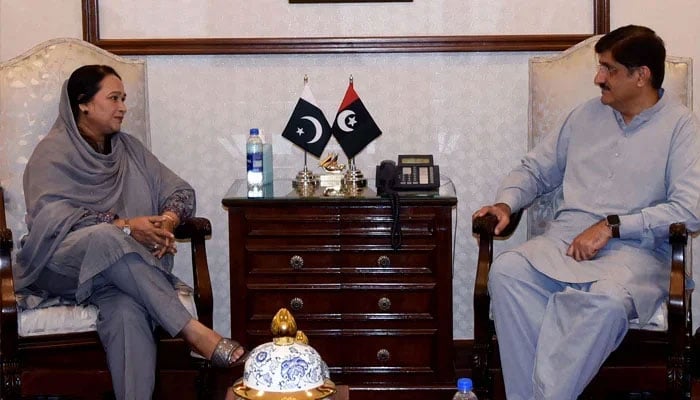Second round of talks on caretaker Sindh CM remains inconclusive
“We need time to finalise the name [for interim CM],” says MQM-P's Rana Ansar
The second round of negotiations, between Sindh Chief Minister Murad Ali Shah and Leader of the Opposition in the dissolved provincial assembly Rana Ansar to select a name for the caretaker chief executive, remained inconclusive.
The talks between the leader of the House and the opposition Leader were held at Sindh Chief Minister House today (Sunday). During the meeting, Muttahida Qaumi Movement-Pakistan’s (MQM-P) leader Ali Khursheedi was also present.
Speaking to journalists after the huddle, Ansar said: “We need time to finalise the name [for interim CM].”
She expressed hope that the name of the caretaker chief minister will be finalised during the third round of talks slated to be held tomorrow (Monday). “Our leadership will table name [for the coveted slot] tomorrow after consultation.”
The MQM-P leader said that she would discuss the names proposed by the Sindh CM with her party leadership, adding that the Grand Democratic Alliance (GDA) also proposed a few names for the slot.
Ansar said they would try to reach a consensus on selecting a name for the interim CM. In case of their failure for reaching a consensus on a name for the province's caretaker chief minister, the matter would then be presented before the parliamentary committee, she added.
On August 11, Sindh Governor Kamran Tessori signed the summary sent by CM Murad which sought the dissolution of the provincial assembly.
“The summary of dissolution of Sindh Provincial Assembly has been signed,” the governor said in a post on the microblogging website X, previously known as Twitter.
It is pertinent to mention that the ruling PPP had discussed the names of Justice (retd) Maqbool Baqir and former Sindh chief secretary Mumtaz Ali Shah for the coveted position whereas the opposition had also discussed a few names for the slot which include Dr Safdar Abbasi, Ghulam Murtaza Khan Jatoi, Shoaib Siddiqui and Younus Dagha.
After the meeting, Murad Ali Shah addressed a press conference and expressed his gratitude to the provincial cabinet for its support and for remaining steadfast in the most difficult time.
“In August 2018, the federal government and the opposition [in Sindh Assembly] took undemocratic measures,” CM Murad lamented. “However, the PPP and my cabinet supported me. I had a good time in difficult circumstances.”
He also criticised former prime minister Imran Khan for ‘disowning the Sindh government’. The outgoing provincial chief executive added that the then-federal government and the provincial opposition made it difficult to run the affairs of the Sindh Assembly.
How is interim chief minister appointed?
Once the provincial assembly is dissolved, the government will require a caretaker setup, irrespective of whether or not the governor approves the summary undersigned by the chief minister.
The assembly will stand dissolved in the next 48 hours as per the Constitution even if the governor does not approve it.
Contrary to the practice in other countries, the Constitution of Pakistan stipulates that a caretaker government will have to be sworn in till a new government is elected by the people.
Article 224 of the Constitution explains the process of appointment of a caretaker government at the centre and provinces.
Until the formation of a caretaker government, Murad will continue his duties as the CM albeit for a few days.
It is only incumbent Sindh Assembly Speaker Agha Siraj Durrani, out of all elected representatives, who will hold his position until the newly-elected lawmakers take an oath and elect his replacement.
For the formation of a caretaker government, CM Murad will write to the leader of the opposition in the Sindh Assembly, within 48 hours of the dissolution of the assembly, seeking three names for the caretaker chief minister and will suggest three names himself.
If an impasse, between the two leaders, lasts for three days, then the speaker will form a committee comprising six members of the outgoing assembly with equal representation from the treasury and the opposition.
To the committee, the CM and the leader of the opposition will forward two nominees each.
The committee then will have three days to evolve consensus on one name. If that fails as well then the names of the nominees will be referred to the Election Commission of Pakistan (ECP) for a final decision within two days.
The selected nominee will perform his/her duties as the interim CM until the formation of a new government in the province. The caretaker chief executive also has the power to induct his own cabinet.
Following the placement of a caretaker chief minister, the ECP is bound to carry out general elections in the province within 90 days.
The electoral body can hold polls within 22 to 45 days because constitutionally it requires at least 22 days to scrutinise the nomination papers of the candidates.
The candidates will be given 29 to 30 days to run the election campaign.
-
Security forces gun down 30 terrorists in multiple IBOs in KP: ISPR
-
MQM-P calls for new province in Sindh
-
US report validates Pakistan military edge over India: PM
-
Banned TTP poses serious threat to Pakistan security: UNSC panel
-
CM Afridi clarifies remarks on by-poll after ECP requests army deployment
-
Dubai sees 3.2m Pakistani passengers in 2025 as airport sets new milestone
-
Security forces kill 23 Indian proxy terrorists in KP's Kurram
-
Pakistan to construct island to boost oil exploration: report












